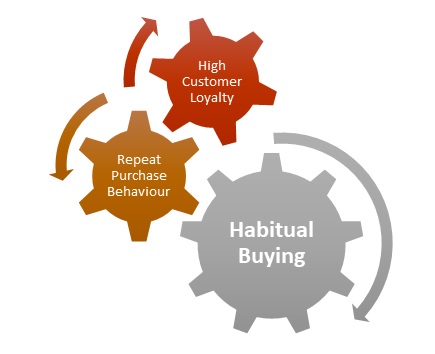Habitual Buying - Definition, Importance & Example
What is Habitual Buying?
Habitual buying is the buying behavior of customers where they are making repeat purchases number of times of an already known brand without the process of high involvement and decisioning. The product is perceived as commodity and doesn’t provide much difference from its rivals. Customer under habitual buying behavior goes for the products which they are buying regularly and where they don’t give much thought before buying it.
Importance of Habitual Buying
Habitual buying consumer buying behaviour may also be due to fact that customer finds the product best fit for his use and keeps on buying it without looking for alternative. And it doesn’t mean that there is less number of choices in front of customer and he has to choose it anyhow. The customer repeatedly chooses the product without giving much thought as the product does not have much difference with others. Repeated purchase is known as habit buying. And the products they purchase are also cheap and there is no hazard in buying it.
Companies put in a lot of effort in ensuring that habitual buying behaviour of a customer is created. This habit formation is done using continuous efforts in delivering customer needs, improving relations and thereby enhancing customer loyalty.

Read More
Examples of Habitual Buying
1. One of the simplest example of habitual buying is purchase of goods of daily needs. The purchase of milk or bread in the nearby store is the example of habitual buying behavior.
2. Despite several brands of beverages or cola items, people develop preferences of a few brands or flavours. This is another example of habitual buying.
Hence, this concludes the definition of Habitual Buying along with its overview.
This article has been researched & authored by the Business Concepts Team. It has been reviewed & published by the MBA Skool Team. The content on MBA Skool has been created for educational & academic purpose only.
Browse the definition and meaning of more similar terms. The Management Dictionary covers over 1800 business concepts from 5 categories.
Continue Reading:
What is MBA Skool?About Us
MBA Skool is a Knowledge Resource for Management Students, Aspirants & Professionals.
Business Courses
Quizzes & Skills
Quizzes test your expertise in business and Skill tests evaluate your management traits
Related Content
All Business Sections
Write for Us